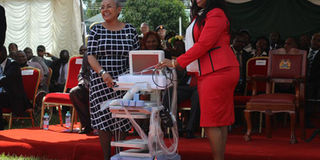Africa can win the war against cancer if all stakeholders join in partnership

First Lady Margaret Kenyatta (left) receives an ultrasound machine from Meru County Governor's wife Phoebe Munya at Meru Technical Training Institute during the presentation of the 28th Beyond Zero mobile clinic on May 27 2015. The county is using the mobile clinic in screening residents for cancer. PHOTO | PHOEBE OKALL | NATION MEDIA GROUP
What you need to know:
- High unawareness about cancer risk and prevention, combined with lack of diagnostic equipment, radiotherapy, chemotherapy, and surgical options further compound the problem.
- I have personally committed to reducing Kenya’s health burden through, among others, the Beyond Zero campaign, and I am seeing to it that breast and cervical cancer information and screening is given to women through mobile clinics spread across the country.
- This year’s conference will serve as a platform for discourse on the emerging cancer problem in Africa and will also act as a learning and sharing opportunity for participants.
It is undisputed that matters of health are key to the development of any country.
Many African countries have, in the past decade, made great strides in achieving certain health goals. We have seen reduced rates of HIV infection and Aids-related deaths. We have seen some countries achieve improved maternal and child health indicators. This is indeed cause for celebration.
But even as we celebrate these achievements, it is important to take note of yet another silent killer that is threatening to reverse our development gains.
This is cancer, a disease that kills more people than HIV/Aids, tuberculosis, and malaria combined. The effects are particularly dire in developing countries, yet cancer is a disease that is highly preventable and curable if detected early.
Seventy per cent of cancers in sub-Saharan Africa are discovered when the disease is advanced, when it is too late for a cure. High unawareness about cancer risk and prevention, combined with lack of diagnostic equipment, radiotherapy, chemotherapy, and surgical options further compound the problem.
With effective awareness and education programmes, cancer morbidity and mortality rates can, indeed, be reduced.
One of the major challenges for African countries is that they are under-resourced and ill-equipped to deal with the growing cancer burden. In addition, government health budgets place more emphasis on communicable diseases such as malaria, tuberculosis, and HIV/Aids, leaving few resources for diseases such as cancer.
The problem partly lies in low awareness levels on the magnitude of the cancer burden and its effect on the economic growth and development of a country.
However, some African governments have made efforts to deal with the growing cancer problem and only need to boost these and share best practices with those that may not have embarked on similar efforts.
It is also important to note that governments cannot do this alone. The war against cancer requires a combined effort of all stakeholders to give higher priority to cancer awareness, education, prevention, screening, treatment, palliative care, and research.
There is a significant role that every entity can play in ensuring that there is a substantially reduced cancer burden in every country. The achievement of this lies in sustained partnerships.
The realisation of improved cancer outcomes is, however, not limited to the government and its stakeholders. Part of the cancer problem is because of our unhealthy lifestyles; it is our responsibility to take care of our own bodies.
I have personally committed to reducing Kenya’s health burden through, among others, the Beyond Zero campaign, and I am seeing to it that breast and cervical cancer information and screening is given to women through mobile clinics spread across the country. I thank all the partners and donors who continue to help me in this endeavour.
As part of my campaign, my office, with the support of the Kenyan Government and in conjunction with the Princess Nikky Breast Cancer Foundation, will from today host the ninth Stop Cervical Breast and Prostate Cancer in Africa Conference (SCCA), whose theme is: “Investing to save lives: The Role of Public-Private Sector Partnerships”.
This conference builds on the success of last year’s convention, which was held in Namibia and which culminated in the Windhoek declaration that re-affirmed Africa’s commitment towards the sustained fight against cancer.
This year’s conference will serve as a platform for discourse on the emerging cancer problem in Africa and will also act as a learning and sharing opportunity for participants.
We expect to establish realistic strategies and action points that will produce cost-effective solutions, which will work towards reducing the number of cancer cases and deaths, as well as improve the quality of life for the afflicted.
It is my hope that the dialogues and partnerships formed in the ninth SCCA conference will result in saving the lives of millions of men, women, and children in Africa.
As part of the endeavour to fight cancer, I urge you all to participate in the free screening that will be on offer at the KICC as part of the SCCA activities. Together, we can beat cancer through formidable partnerships.
The author is the First Lady of the Republic of Kenya




